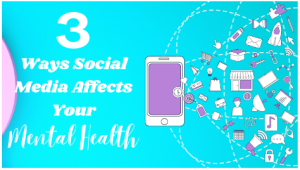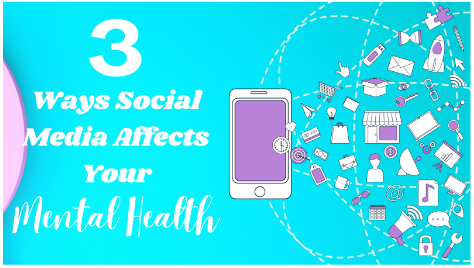Over the last few years, social media has become an integral part of our lives. Whether in your teenage years, as a young adult, or as a senior citizen, life without social media seems like an old tale that never existed

But what many people don’t realize is that social media is like fire. Many people might see it as a way to light their homes, but it can also potentially destroy them. Considering every social media platform has various pros and cons, it is imperative to understand how the same platforms affect your mental health.
In the last couple of years or ever since Covid 19, there has been much debate over the potentially harmful effects of social media. While many people found solace through these platforms, many others have also succumbed to various mental health issues due to the havoc that social media wreaked.
Want to know how social media affects your mental health and is there anything you can do about it? Continue reading to find out.
Impact of Social Media on Mental Health
Wondering if social media is bad for your mental health? The short answer is yes!
Even though social media offers many benefits and has connected us worldwide in a global village, some things and aspects of social media can cause us more harm than good.
For many, social media has proven to be a source of positivity and ultimate human connection. Ever since the pandemic, people have started relying more on social media to make new friends and find acquaintances, considering how physical social interaction has decreased manifold.
However, the impact of social media and the debate around it is far more complex than we can imagine. Although social media is an absolute delight, it does harm your mental health, one that can have grave consequences.
Let’s find out what are some ways that social media affects your mental health,
-
FOMO (Fear of Missing Out)
One common term you have probably encountered is Fear of Missing Out, abbreviated as FOMO.
But you may not know that this term has been around a lot longer than social media. With the advent of Twitter, Instagram, Facebook, and TikTok, everyone has started considerably showcasing snippets of their lives on social media.
Whether someone is traveling to a foreign land, having dinner on their balcony, or just eating comfort food at the end of the day, it is all on social media.
This showcasing of your entire life may lead people to believe that they are not living a good and more content life as others are. It can ingrain feelings of jealousy, complexity, and fear in people who can’t meet the same living standards as others on social media.
When you feel like you’re missing out on everything good the world has to offer, it can begin to damage your self-esteem, thus leading to depression, anxiety, and, in some cases, feelings of loneliness.
-
Self-Absorbed Behavior
Social media has given a voice to everyone. Every user of Twitter or Instagram may feel entitled to have an opinion about things, scenarios, communities, and incidents that may not even have anything to do with them.
While we encourage the importance of having opinions and raising your voice on social media, it can lead to an unhealthy sense of self where people may begin to consider their opinions as something set in stone.
One of the most common problems we have encountered on social media is unhealthy and illogical debates where people lose their tone only to prove a point. It can damage your relationships and even drive a wedge between you and your loved ones.
So, while having an opinion is important, we must also understand the importance of agreeing to disagree. We must realize that today, the way information is disseminated, everyone is entitled to their opinions, which shouldn’t harm personal relationships.
-
Body Image
Recent studies have highlighted the emergence of body image concerns as a noteworthy negative consequence of using too much social media.
A troubling trend has been identified, particularly among young individuals, primarily women, who use social media filters regularly. This trend has given rise to a newly coined term: Snapchat dysmorphia.
While not officially recognized as a mental health diagnosis at this point, Snapchat dysmorphia manifests when individuals compare their unaltered appearance to their filtered, modified selfies. You might have noticed that most influencers only come on cameras or snap pictures with filters.
The term encapsulates the profound desire to modify physical features to align with the altered images portrayed through filters. Feelings of discontent and dissatisfaction can arise due to the heightened emphasis on perceived flaws fueled by social comparisons.
This phenomenon has reached such an extent that plastic surgeons are now observing a significant increase in individuals seeking cosmetic surgery. These surgeries are primarily to eliminate flaws and natural features and transform their facial appearances to resemble the filtered versions of themselves.
Moreover, with the ever-growing influencer culture, fake beauty standards have never seen such a rise. People are increasingly concerned about their bodies, complexion, height, and facial features.
Everyone is in a rat race to meet the fake beauty standards set by the industry, which has only further damaged the self-esteem of many.
Final Thoughts
We hope this article sheds some light on the growing repercussions of using social media. Many believe that social media only positively impacts the current, previous, and future generations.
But what many have missed is that excessive use of anything is bad. Apart from body image, FOMO, and self-absorption, there is also cyberbullying and harassment as some of the major players in how social media affects your mental health.
Harassment has been common with people holding public profiles. They have all been subjected to hate and bullying at some point in their careers of being a social media personality.
You need to be very cautious with the use of social media. While it has many positive effects, its cons outweigh the pros. So, being mindful about who you follow, setting screen time, and understanding the importance of thoughtful conversations can help you eliminate the unneeded anxiety in your lives.
Is there anything you’d like to add to the conversation? Please leave us with your feedback below.

